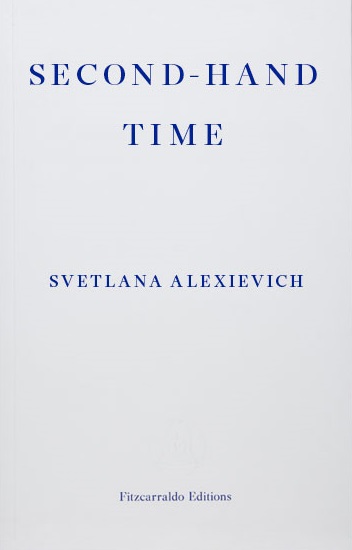
Categorii: Neclasificat, Neclasificat
Limba: Engleza
Data publicării: 2019
Editura: Fitzcarraldo Editions
Tip copertă: Paperback
Nr Pag: 704

Second-hand Time is the latest work from Svetlana Alexievich, winner of the 2015 Nobel Prize in Literature. Here she brings together the voices of dozens of witnesses to the collapse of the USSR in a formidable attempt to chart the disappearance of a culture and to surmise what new kind of man may emerge from the rubble. Fashioning a singular, polyphonic literary form by combining extended individual monologues with a collage of voices, Alexievich creates a magnificent requiem to a civilization in ruins, a brilliant, poignant and unique portrait of post-Soviet society out of the stories of ordinary women and men.
Praise for Svetlana Alexievich
‘In this spellbinding book, Svetlana Alexievich orchestrates a rich symphony of Russian voices telling their stories of love and death, joy and sorrow, as they try to make sense of the twentieth century, so tragic for their country.’
— J. M. Coetzee, winner of the 2003 Nobel Prize in Literature
‘Absolutely fantastic.’
— Karl Ove Knausgaard
‘The non-fiction volume that has done the most to deepen the emotional understanding of Russia during and after the collapse of the Soviet Union of late is Svetlana Alexievich’s oral history Second-hand Time.’
— David Remnick, New Yorker
‘Second-Hand Time is [Alexievich’s] most ambitious work: many women and a few men talk about the loss of the Soviet idea, the post-Soviet ethnic wars, the legacy of the Gulag, and other aspects of the Soviet experience. ... Through her books and her life itself, Alexievich has gained probably the world’s deepest, most eloquent understanding of the post-Soviet condition.’
— Masha Gessen, New Yorker
‘The people she talks to, the co-authors of her books, are working people, women and elderly people – precisely those who are left behind. … Alexievich’s voices are those of the people no one cares about, but the ones whose lives constitute the vast majority of what history actually is. … This is history, major history, but written, as all history should be, from below.’
— Keith Gessen, Guardian
‘A series of monologues by people across the former Soviet empire, it is Tolstoyan in scope, driven by the idea that history is made not only by major players but also by ordinary people talking in their kitchens.’
— Rachel Donadio, New York Times
‘Alexievich’s work follows the strands of thought and emotion wherever her voices take her – through nightmares, but also flashes of joy … The work is unique in the intimacy of the experience transmitted through the writing: which is, after all, only the ability to have a human ear, to listen, and to publish.’
— John Lloyd, Financial Times
‘I am engrossed in Svetlana Alexievich’s extraordinary Second-hand Time, an oral tapestry of post-Soviet Russia.’
— Julian Barnes, Guardian
‘Second-hand Time is, at one of its many levels, about what the Soviet Union was and what its legacy still means. [Alexievich] writes a new form of history unlike anything that goes before … reading her deep exploration of what a Russian world would be without the myths of nationalism, I realised I had in my hands a book that transcends its geography and makes it essential reading in Brexit Britain.’
— Rachel Holmes, Guardian
‘[A] stunning chorale.’
— Marcel Theroux, Guardian
‘[An] epic fresco of an empire’s bitter aftermath. … Alexievich retreats into the wings to let her subjects speak. But this is the art that conceals art. Her editor’s flair for selection, contrast and emphasis, her almost cinematic touch with cuts, pans and close-ups, make her a documentary virtuoso and not a transcription machine.’
— Boyd Tonkin, Spectator
‘The firsthand accounts here offer a dizzyingly complex and contradictory look into what it was like to be a subject of the Great Socialist Experiment.’
— Wall Street Journal
‘[Second-hand Time is] hailed as Alexievich’s masterpiece – not only for what it says about the fall of the Soviet Union but for what it suggests about the future of Russia and its former satellites.’
— Tobias Grey, Newsweek
‘The narratives Alexievich has sculpted take place in landlocked settings and yet, in Bela Shayevich’s English translation, they come at the reader in thunderous waves, churned from oceans of history. This book – important without sounding self-important – is heart-breaking and impossible to put down.’
— Max Liu, Independent
‘Her subjects argue with and lie to themselves; nearly everyone talks about love and loss in the context of war, hunger, betrayal, financial ruin, and emotional collapse. Yet with little intrusion from Alexievich and Shayevich’s heroic translation, each voice stands on its own, joining the tragic polyphony that unfolds chapter by chapter and gives expression to intense pain and inner chaos.’
— Publishers Weekly
‘Second-hand Time is a testamentary record, a safe-keep of Russians’ beliefs and feelings as they existed in our time. Ms. Alexievich’s format of revealing history through individual stories feels more nuanced and more perceptive than conventional histories, a result that validates her conviction that it is at the individual level "where everything really happens."’
— Asymptote
‘For both the author and the reader, this landmark novel is a way to make sense of the dramatic changes that defined life in the Soviet and post-Soviet world.’
— Calvert Journal
Svetlana Alexievich was born in Ivano-Frankovsk in 1948 and has spent most of her life in the Soviet Union and present-day Belarus, with prolonged periods of exile in Western Europe. Starting out as a journalist, she developed her own non-fiction genre which brings together a chorus of voices to describe a specific historical moment. Her works include The Unwomanly Face of War (1985), Last Witnesses (1985), Boys in Zinc (1991), Chernobyl Prayer (1997) and Second-hand Time (2013). She has won many international awards, including the 2015 Nobel Prize in Literature for ‘her polyphonic writings, a monument to suffering and courage in our time’.
Bela Shayevich is a Soviet-American artist and translator.